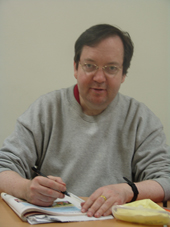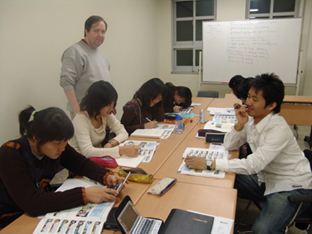 Although I have been teaching English at Keimyung University for the Fashion & International Specialist Education Program for almost six years, I cannot forget my experience in Sang-ju City.
Although I have been teaching English at Keimyung University for the Fashion & International Specialist Education Program for almost six years, I cannot forget my experience in Sang-ju City.My first home was New York City where I was born, raised and educated. I attended The City College of New York for my Bachelor of Arts degree (magna cum laude) in English and American Literature. My second home was Boulder, Colorado where I attended the University of Colorado at Boulder for two wonderful years while earning my Master of Arts degree in English Literature and Creative Writing.
Years later, I worked for the Korean Ministry of Education, teaching English conversation at Sang-ju Girls’ Middle School for one year, 1997 to 1998. I was their first native English speaker, and I taught more than 400 students per week. Sang-ju Si was my third home.
There was nothing to prepare me for life and work in Sang-ju Si. It is an astonishingly beautiful city surrounded by mountains. On my first night there, the head English teacher drove me to a countryside restaurant. There were about twenty-five teachers waiting for me, and the Principal as well. It was a hot, humid night in September. I did not know any words in Korean except the ones that all true beginners here know. However, the good humor, positive feeling and terrific welcoming party erased any uneasiness. Sang-ju is a very traditional city; the men teachers sat at one table and the women teachers sat at another. At one point during the dinner, the women teachers sang out to me: “We are alone!” They were joking that they were single, when, in fact, they were all married. It was good fun.
Sang-ju is, as many people know, the bicycle capital of South Korea. There are bicycle paths on all of the larger roads, and seeing adults, teen-agers and children riding their bicycles to work and school, and knowing that the people of Sang-ju took pleasure traveling from one place to another using their own physical energy gave me a very satisfied feeling. People had already been talking about greenhouse gasses and global warming in 1997-98, and I was proud to live in a city where the people did not depend mainly on cars to go somewhere. When I had first arrived in Sang-ju, and I saw ghost-like bicycle riders wearing white surgical masks, I was a bit alarmed; however, my co-teachers told me that these bicycle riders wearing white masks were protecting themselves from breathing in cold as well as polluted air. In addition, the yellow wind, or “Hwang Sa” from China was a hazard too, just as it is in Daegu.

Later on, after I had taught at Sang-ju-Girls’ Middle School for about three months, I became friendly with all of the Korean English teachers. I co-taught with all of them, but there was one English teacher among five who I thought was the best; she happened to be a woman. She treated the students as though they were young human beings, and although she did not tolerate any kind of impolite behavior from students whatsoever, she knew how to speak to them to get their attention and hold it. This teacher and I enjoyed talking about the differences between New York City and Sang-ju Si. We decided to have lunch together a few times at a local sushi restaurant, and to enjoy polite conversation about teaching and our students. Although one man and one woman did not usually eat lunch by themselves in Sang-ju Si, nobody at Sang-ju Girls’ Middle School said anything to either of us. I think that by my third month teaching at the school, most of the other teachers, as well as the Principal and Vice-Principal, had accepted my country’s custom of men and women colleagues eating lunch together openly as friends. This is one kind of cultural transformation.
We had a speaking contest in Sang-ju, and if we won, we would be able to enter the Kyungsangbuk-do Provincial Contest. The speaking contest was really a short drama. It was called “The Mayor of Sang-ju.” The drama was about three sisters; one was traditional, one was independent and wanted to be the Mayor of Sang-ju-Si; the youngest sister just wanted her older sisters to stop arguing so she could sleep. The main idea of the drama is that young women often want a high social position in Korean life. Women and men, though different, are equal as human beings, and society should allow women to hold the same professional positions as men. Many countries and cultures embrace gender equality. Sang-ju accepted gender equality to some degree, evidently, because our drama won first prize among all the schools in the city.
My best friend in Sang-ju was a fellow English teacher. He looked like a country schoolmaster, short and stocky, with a dark, lined face that made him look as wise as he was. Mr. Yuhn-Bok Kim already had a good reputation as an excellent poet in the United States because he had won the prestigious Walt Whitman Poetry Award. Nobody knew in 1997-98 that he would soon be very respected as a writer and translator in South Korea too. On the first day of school in the fall semester, Mr. Yuhn-Bok Kim asked me about myself. I told him that as well as being a teacher of English as a Second or Foreign Language, I also considered myself a writer. He was overjoyed when I told him that I had written and published poetry in New York City and in Boulder, Colorado. He told me that he had published four books of poetry at that time; he wrote poetry in English and translated his own poetry into Korean, and other writers’ poetry in Seoul into English. He immediately gave me a copy of his fourth book of poetry, Lost Landscape, in which he wrote on the title page: “For Gregory Kahn with friendship and love from heart.” It is this wonderful Korean trait of giving and sharing that I admire tremendously.
After a while, Mr. Yuhn-Bok Kim and I used to walk back and forth after school on a road that connected both of our dwellings. We named this ‘Kim-Kahn Road’ because we used it often. We would talk about Sang-ju and Kyungsangbuk-do culture and society. Sometimes, if the conversation continued longer than it took to get to my apartment on the west side of the city or to his house on the south side near Sang-ju Yuk, we would turn around and walk back and forth until the conversation ended.
He told me some common traditions and beliefs in Korea. One wise saying, that I believe to be true in spirit as well as in reality, is that when you give a gift to a friend or colleague, you will receive 10 gifts in return. He also told me that when you accomplish something in your life, such as passing an exam, getting a driver’s license, or if your son or daughter wins an academic prize, you should celebrate your good fortune by giving small gifts to all the people you know so that they can share in your accomplishment. This action expresses the feeling and idea that we are all connected. When one person does well, he or she should share this feeling with his/her community of family, friends and colleagues. We are not alone; each action affects the people we know.
Korean writers have finally recognized Mr. Yuhn-Bok Kim. After writing and teaching for 43 years, he recently won the Korea Pen Award in 2005, which goes to the best poet in Korea. Mr. Yuhn-Bok Kim is, in a sense, a National Treasure. We remain close friends to this day.
I left Sang-ju Si in 1998, and came to Keimyung University to work for the Fashion & International Specialist Education Program in 1999. It is here, at Keimyung, that I learned more about Korean life. In Korea, people are brought up to help their families, and to work together (commonality is emphasized). Students try to include everyone in their class in a common effort to study, work and to be successful.
Individualism is emphasized in Western countries. While this can be a positive and liberating way of life, I find that too many people are left behind. Many succeed, but too many fail.
In Korea, the concept of ‘family’ is so important. When young people attend school, their concept of helping each other is developed and strengthened. Students care so much for each other that when one student has, let’s say, influenza, instead of being scared of getting sick, as most Western students would be, most Korean students think only of caring for their ill classmate.
Korean students usually help each other with their homework assignments and projects. They will gather at one person’s house together for days to complete a project; this demonstrates how dedicated Koreans are to each other. Classmates are like extended family.
Western education brings more emphasis to the importance of individual thinking and forming independent ideas. Can’t we find a way of life that combines both ideals? Young people who remain loyal to their families and social values while maintaining the right to express their own minds, so vital to being true to themselves. The outcome of these two dichotomies could be the creation of a new, stronger social fabric.








